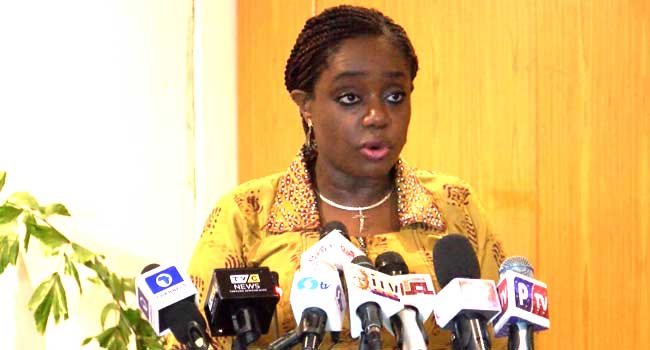- Three firms accessed N23.15bn from domestic bonds market
Nigeria could spend a total amount of $18.27 billion to service her external debt, which has continued to rise, between 2018 and 2027, the Debt Management Office (DMO) has projected.The Debt Office stated this in its recently released 2017 Annual Report and Statement of Accounts. Nigeria’s external debt stock outstanding as at December 31, 2017, was $18.91 billion, compared to $11.41 billion as at December 31, 2016, representing an increase of $7.50 billion or 65.82 per cent. The Federal Government looks set to stick to its debt management strategy of focusing on tapping external sources of financing in preference to domestic borrowing.
The DMO also disclosed that the country’s total external debt service for 2017 increased by $110.95 million or 31.42 per cent to $464.05 million, compared to $353.09 million in 2016. Specifically, Debt Office stated: “Increased debt service payments in the sum of $2,011.28 million, $2,192.55 million and $3,294.66 million would be made in 2021, 2023 and 2027, respectively, when the debut 6.75% January 2021 $500 million 10-year Eurobond issued in 2011, second tranche of the $1 billion Eurobonds – 6.375% July 2023 $500 million 10-year issued in 2013 and the 6.5% November 2027 $1.5 billion 10-year Eurobond series issued in 2017 would be due for redemption.”
A breakdown of debt service (principal repayments and interest payments) for last year, provided by the DMO, shows that $191.72 million or 41.32 per cent of external debt service payments were made to multilateral creditors, $71.83 million or 15.48 per cent to bilateral creditors and $150.32 million or 32.39 per cent to holders of Eurobonds. Further statistics that the DMO presented in the report indicates that debt service payments in respect of Oil Warrants, Diaspora Bond and Agency Fees for 2017 were $41.72 million, $8.44 million and $0.02 million, representing 8.99 per cent, 1.82 per cent and 0.004 per cent of the total external debt service payment made during the year, respectively.
It explained that increase in the nation’s external debt was largely due to the government’s shift towards external financing as part of its debt management strategy of rebalancing the public debt portfolio, in order to attain an optimal composition of 60:40 for domestic and external, aimed at reducing debt service costs. “Specifically, the growth of external debt was mainly on account of additional disbursements of multilateral and bilateral loans, as well as increased borrowings from the International Capital Market. The external debt-to-Gross Domestic Product (GDP) ratio increased from 3.26 per cent as at December 31, 2016, to 4.85 per cent as at December 31, 2017,” the DMO added.
Similarly, the Debt Office, which revealed that the country’s total outstanding public debt, as at December 31, 2017, went up by N4.37 trillion or 25.15 per cent to N21.73 trillion, compared to N17.36 trillion in 2016, attributed the increase mainly to the level of deficit in the 2017 Appropriation Act, which, it pointed out, needed to be funded through both domestic and external borrowing. Specifically, the DMO said: “While the increase of $7.50 billion in external debt stock was largely on account of additional disbursements on existing loans (multilateral and bilateral), issuances of Eurobonds of $4.5 billion and the debut $300 million Diaspora bond in 2017, the growth of N1.53 trillion in FGN Domestic Debt stock was due to additional issuances of FGN Securities for the funding of 2017 appropriated budget deficit through the introduction of new products in the domestic debt market.
The products included FGN Savings Bond, Sovereign Sukuk and the Green Bond.” According to the DMO, the external debt stock of $18.91 billion constitutes 26.64 percent of the country’s total public debt stock, while the total domestic debt stock (FGN, States and FCT’s domestic debt stock) was N52.09 trillion or 73.36 per cent of the total public debt stock. Interestingly, the debt management agency emphasised in the report that the ratio of Nigeria’s total public debt-to-GDP was 18.20 per cent in 2017 compared to 16.27 per cent in 2016, which, it noted, “was still within the country’s Specific Debt Limit of 19.39 per cent in the mediumterm up to end-December 2017, and far below the international threshold of 56 per cent for countries in Nigeria’s peer-group, as well as the WAMZ convergent threshold of 70 per cent.”
In the Annual Report and Statement of Accounts, DMO revealed that only three corporate entities accessed the domestic bonds market in 2017 with a total issuance of N23.15 billion. It listed the three corporates to be Dufil Prima Foods Plc., Viathan Funding Plc. and LAPO Micro Finance Bank SPV Plc. DMO stated that it expected corporate bonds issuances would increase in the near term with the easing of inflationary pressure and reduction in yields of sovereign benchmark. However, with the World Bank and the International Monetary Fund (IMF), as well as rating agencies, such as Fitch and Moody’s, having already warned about Nigeria’s rising debt servicing costs, analysts believe that normalisation of monetary policy in the United States (rate hikes) could push the Nigerian government to adjust its debt management strategy.
.new telegraph














